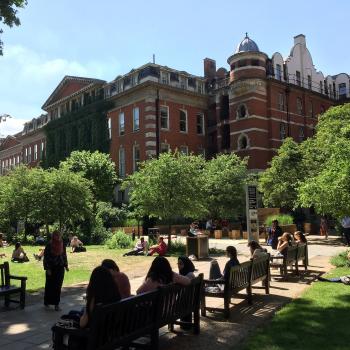
(Wikimedia Commons public domain image)
***
I’m continuing the theme of my blog entry from yesterday, “Our only hope for full flowering”:
In my remarks at the 2017 FairMormon conference, one of my comments concerned the fact that none of us achieve our full potential in this life. In fact — and, for this point, I used the tragic story of Ludwig van Beethoven as an illustration — many of us die sadly young, undernourished, uneducated, impoverished, and/or ill, coming nowhere near full realization of our talents and abilities, our potential for service and accomplishment.
To me, this offers a powerful reason to hope that life will continue beyond the grave. It certainly doesn’t prove that we’re immortal, but it strongly encourages me, at least, to desire such continuation.
However, I’ve also often thought about the matter from a quite different angle:
From where I’m positioned, geographically and historically, I have enormous freedom of enjoyment. I can eat Mexican or Thai or French or Indian or Chinese or American or Italian food. If I choose, I can do so while watching a documentary about ancient Rome or the Beatles, or listening to an excellent recording of the Vienna Philharmonic performing a symphony by Bruckner. Afterwards, I can read Homer or Dante or Yeats or Hemingway or Tom Clancy, or watch Blue Bloods, or listen to the Beach Boys.
Others, in other locations, don’t enjoy the variety that I do. If you’re a rural Mexican peon, you eat Mexican food every day — and, very likely, a limited range of that. The same, mutatis mutandis, is true for Chinese and Indian peasants, and so forth. And they seldom if ever get to enjoy Mozart or John Coltrane or Kathy Mattea or Bob Dylan. They never listen to recordings of the Berlin Philharmonic or the London Symphony Orchestra or the Incredible String Band. Nor did any ancient Roman, no matter how aristocratic, enjoy the variety of diet that’s available to average Americans today — fruits at all seasons, vegetables unknown to the Empire, milk shakes, Korean barbecue, hamburgers, Iskender kebap, turkey chili, and hundreds of other culinary wonders.
I’m privileged beyond any Roman emperor of the past in my range of actual and potential experiences. I live in far greater comfort — e.g., air conditioning, central heating, indoor plumbing, electric lights, and so forth. Moreover, I’ve been to Rome, but Augustus Caesar never came to Utah, never flew in a helicopter over the lava cauldrons on the Big Island of Hawaii, never rowed a canoe on Lake Louise, never even wandered about the alpine meadows of the Berner Oberland.
But here’s where my thoughts began to go a few summers ago, while I was sitting at the Utah Shakespeare Festival:
I can (and do) enjoy reading Othello and King Lear, or taking in performances of Two Gentlemen of Verona and The Merchant of Venice. Chaucer and Dante could never do that. Nor could Shakespeare’s Elizabethan audiences listen to Verdi’s Otello or watch Franco Zeffirelli’s film of Romeo and Juliet or Kenneth Branagh’s version of Henry V.
Moreover, neither Shakespeare nor his contemporaries ever had the opportunity to read Goethe, or Dickens, or Tolkien, or Kafka, or Keats, or Lorca, or Kazantzakis. Just as Henry Purcell and John Dowland — two early English composers that I like very much — never got the chance to hear Bach, Strauss, Brahms, Wagner, Tchaikovsky, Prokofieff, and Stravinsky.
Here, though, is my issue:
Presumably, the development of civilization, of literature and music and art (and science and other fields), hasn’t stopped. We haven’t achieved stasis or equilibrium.
And, just as I pity the generations before Shakespeare because they never saw As You Like It and Richard III, and the generations before Beethoven because they never heard his Ninth Symphony, and those who came before Newton because they never learned about modern physics, so am I, too, to be pitied.
Why?
Because there will be future Shakespeares, Beethovens, and Newtons (and Wagners and Tschaikovskys and Goethes and Einsteins) and I will never read, or hear, or read about their work. Nor will anybody now living.
And that is merely another way in which our lifetimes are too short.
There are beautiful sunsets and landscapes that I’ll never see, wonderful foods that I’ll never sample, brilliant songs and symphonies that I’ll never hear. We’re permitted, in this mortal lifetime, to experience only the tiniest fraction of the infinite variety that the world has to offer and that it will, over future centuries, continue to bring forth.
In certain moods, I find that unutterably sad.
***
Here, though, is another item that I found some time back in the Christopher Hitchens “How Religion Poisons Everything” File©. It’s from Why Science Does Not Disprove God, by the late Israeli-American mathematician, statistician, and science writer Amir Aczel. (He died of cancer toward the end of 2015, at the relatively young age of 65. A sad loss.). Anyway, I was struck by this observation from Dr. Aczel, on page 205 of his book:
Daniel Dennett is a leader in the atheism movement in America. He and his wife organize and participate in cruises for atheists, as well as other events aimed at cementing a world-wide community of atheists. But these atheist groups do not get involved in charitable work, as many religious organizations do. While staying at a hospital, you may be visited by a nun, a rabbi, or an imam, bringing you food or newspapers or comforts of many kinds, as many people know from personal experience. And it is true that sometimes religious people do this in an effort to convert patients — but not always. There are innumerable examples of religious persons who engage in charitable work in hospitals, poverty-stricken communities, halfway houses, and the like out of sheer charity and the urge to do kind things for complete strangers. I have never heard of an atheist group volunteering to offer comfort to the ill or the distressed.
I don’t know whether his impression of atheist groups is true. I haven’t yet confirmed it. But his impression is my impression, as well.
















